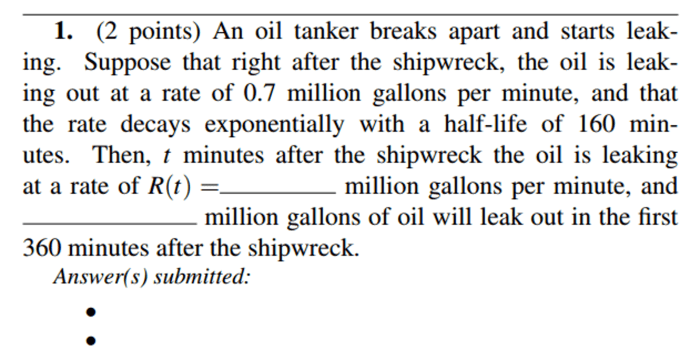An oil tanker breaks apart and starts leaking, unleashing a torrent of crude oil into the ocean, posing a grave threat to marine life, coastal communities, and the global economy. This catastrophic event raises urgent questions about the safety of maritime transportation, the environmental consequences of oil spills, and the effectiveness of our response mechanisms.
The consequences of an oil tanker spill are far-reaching, affecting not only the immediate vicinity of the spill but also ecosystems and economies worldwide. Understanding the impact, exploring mitigation strategies, and implementing robust regulatory measures are crucial to prevent and mitigate the devastating effects of such incidents.
Environmental Impact

The rupture of the oil tanker poses significant environmental risks. The spilled oil can contaminate marine life, disrupting food chains and habitats.
Spread and Persistence of Oil Spill
- The oil slick can spread over vast areas, driven by wind and currents.
- The oil may persist in the environment for years, slowly breaking down and releasing harmful chemicals.
Effects on Marine Life and Ecosystems
- Oil can coat and suffocate marine organisms, such as seabirds, fish, and marine mammals.
- The spill can disrupt feeding, breeding, and migratory patterns, affecting entire ecosystems.
Long-Term Effects of Oil Contamination, An oil tanker breaks apart and starts leaking
- Chronic exposure to oil can cause reproductive problems, developmental abnormalities, and reduced survival rates in marine life.
- Oil can also accumulate in sediments, contaminating the food chain and potentially harming human health.
Economic Consequences

The oil spill has far-reaching economic implications for the shipping industry, coastal communities, and various economic sectors.
Financial Implications for Shipping Industry
- The responsible shipping company faces potential liabilities for cleanup costs, compensation to affected parties, and fines.
- The incident may also impact insurance rates for oil tankers, increasing operating costs.
Impact on Coastal Communities
- Oil spills can damage tourism and recreational activities, which are important sources of income for coastal communities.
- The spill may also affect fishing and aquaculture industries, leading to job losses and economic hardship.
Estimated Cleanup and Recovery Costs
- The cleanup and recovery efforts can be extensive and costly, involving containment, oil removal, and environmental restoration.
- The long-term economic impact may extend beyond the immediate cleanup costs.
Safety and Mitigation

Preventing and responding to oil spills requires robust safety measures and effective mitigation strategies.
Safety Measures in Place
- Oil tankers are subject to safety regulations, including double hulls, navigation systems, and emergency response plans.
- Monitoring systems and surveillance technologies help detect and track oil spills.
Effectiveness of Containment and Cleanup Technologies
- Containment booms and skimmers can help contain and remove oil from the water surface.
- Dispersants and bioremediation techniques may be used to break down or absorb the oil.
Improvements to Enhance Safety and Reduce Risk
- Strengthening regulations and enforcement can improve tanker safety and reduce the risk of spills.
- Investing in advanced containment and cleanup technologies can enhance spill response capabilities.
- Encouraging the use of alternative fuels and cleaner shipping practices can reduce the potential for oil spills.
Legal and Regulatory Implications
Oil spills raise complex legal and regulatory issues, involving liability, compensation, and environmental protection.
Legal Liabilities and Responsibilities
- The responsible party may face legal liability for negligence, environmental damage, and economic losses.
- International conventions and national laws establish frameworks for determining liability and compensation.
Regulatory Framework and Effectiveness
- Regulatory agencies enforce environmental standards and oversee spill response efforts.
- The effectiveness of regulations depends on enforcement, compliance, and regular updates.
Improvements to Strengthen Legal and Regulatory Measures
- Clarifying liability and compensation mechanisms can ensure timely and fair resolution of claims.
- Strengthening environmental regulations and penalties can deter spills and promote responsible shipping practices.
- International cooperation and harmonization of regulations can enhance global spill prevention and response efforts.
Lessons Learned and Best Practices

Previous oil spill incidents offer valuable lessons for improving spill prevention, containment, and cleanup strategies.
Lessons Learned from Past Incidents
- The Exxon Valdez spill highlighted the need for double hulls and improved navigation systems.
- The Deepwater Horizon disaster demonstrated the challenges of containing and cleaning up deep-sea oil spills.
Best Practices for Spill Prevention and Response
- Rigorous maintenance and inspections can reduce the risk of tanker accidents.
- Preparedness plans and regular training exercises enhance spill response capabilities.
- Collaboration between industry, government agencies, and scientific experts is crucial for effective spill management.
Recommendations to Improve Preparedness and Response
- Investing in research and development of innovative containment and cleanup technologies.
- Establishing international agreements for coordinated spill response efforts.
- Educating the public and stakeholders about oil spill risks and prevention measures.
Detailed FAQs: An Oil Tanker Breaks Apart And Starts Leaking
What are the primary environmental concerns associated with an oil tanker spill?
Oil spills can have devastating effects on marine life, contaminating water and sediment, harming marine organisms, and disrupting ecosystems.
How does an oil spill impact coastal communities and economies?
Oil spills can damage fisheries, tourism, and other economic activities, leading to job losses and economic hardship in coastal communities.
What measures can be taken to prevent and mitigate the risks of oil spills?
Enhancing tanker design and maintenance, implementing stricter regulations, and investing in advanced spill response technologies are crucial for preventing and mitigating oil spills.